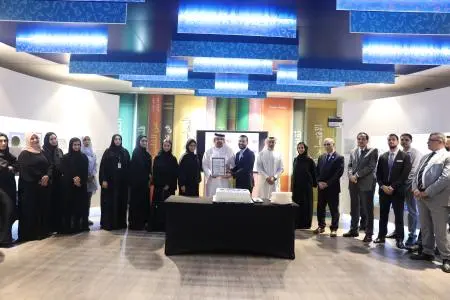PHOTO
Dubai – The Mohammed bin Rashid Al Maktoum Knowledge Foundation (MBRF) has received the International Standardisation Organisation (ISO) 9001:2015 Certification for Quality Management Systems, which serves to promote quality standards in services and programmes, establish sustainability, and achieve the Foundation’s strategic objectives.
Following the directives and support of His Highness Sheikh Ahmed bin Mohammed bin Rashid Al Maktoum, Chairman of MBRF, the Foundation’s team had intensified its efforts to implement all standards and requirements for the certification, beginning with mapping out MBRF’s stakeholders and determining their needs and expectations, then setting quality objectives and following up on their implementation. The Foundation also drafted a quality policy, as well as safety and prevention measures, training its employees to abide by them and setting international standards for choosing suppliers.
MBRF’s CEO His Excellency Jamal bin Huwaireb said: “The Mohammed bin Rashid Al Maktoum Knowledge Foundation adds another achievement to its track record with the ISO certification for Quality Management Systems, which was the fruit of the relentless efforts of the Foundation’s team to meet the programme’s requirements and standards. This proves the Foundation’s ability to rapidly and effectively develop its projects, initiatives, and work environment.”
“We congratulate our employees on this tremendous achievement, which will undoubtedly upgrade our programmes and projects, place us on par with our international counterparts and ensure the sustainability of our achievements,” H.E. added.
Standards for the ISO 9001:2015 are issued by the International Standardisation Organisation, and any institution can implement these standards and conditions, regardless of its size, sector, or the products and services it provides.
The certification requirements include: An internal corporate management system to ensure the implementation of these requirements; a well-established model to improve quality in the management of operations, programmes and projects (especially since the certification requires documenting internal systems and procedural steps, and creating an organisational performance management system relying on periodic performance indicators and measures); and finally, the certification requires a clear description of responsibilities and mandates.
-Ends-
© Press Release 2018Disclaimer: The contents of this press release was provided from an external third party provider. This website is not responsible for, and does not control, such external content. This content is provided on an “as is” and “as available” basis and has not been edited in any way. Neither this website nor our affiliates guarantee the accuracy of or endorse the views or opinions expressed in this press release.
The press release is provided for informational purposes only. The content does not provide tax, legal or investment advice or opinion regarding the suitability, value or profitability of any particular security, portfolio or investment strategy. Neither this website nor our affiliates shall be liable for any errors or inaccuracies in the content, or for any actions taken by you in reliance thereon. You expressly agree that your use of the information within this article is at your sole risk.
To the fullest extent permitted by applicable law, this website, its parent company, its subsidiaries, its affiliates and the respective shareholders, directors, officers, employees, agents, advertisers, content providers and licensors will not be liable (jointly or severally) to you for any direct, indirect, consequential, special, incidental, punitive or exemplary damages, including without limitation, lost profits, lost savings and lost revenues, whether in negligence, tort, contract or any other theory of liability, even if the parties have been advised of the possibility or could have foreseen any such damages.




















